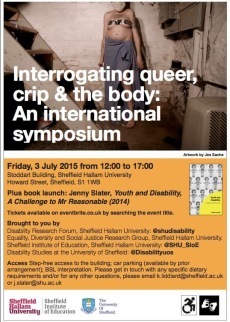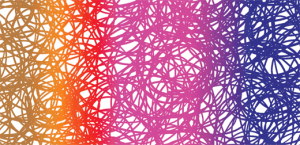

Bringing disabled women together, mobilising
and sharing through lived experiences
Violence Against Disabled Women – an European report
While we were at the Screening AccSex event at Leeds University, Sarah Woodin presented the findings of their report Access to Specialised Victim Support Services for Women with Disabilities who have experienced Violence which included guidance from Ruth Bashall and Susie Balderston.
This research is investigating violence against disabled women and their access to specialised women’s support services. Funded through the European Commission’s Daphne III programme and with international leadership from the Ludwig Boltzmann Institute, the project is running from 2013 to 2015 in four countries:
- Austria, (Ludwig Boltzmann Institute)
- Germany (University of Giessen)
- Iceland (University of Iceland)
- United Kingdom (University of Leeds and University of Glasgow)
About the research
There are several elements, which include:
- Assessment of  the legal and policy framework
- Generation of extensive new data from disabled or Deaf women (through focus group discussions, in-depth-interviews) and service providers (online-survey, interviews with staff members), and
- Development of good practice examples and recommendations.  
187 disabled women from the four countries took part (106 women in focus groups and 81 women in individual interviews). They included women with mobility or sensory impairments, women with intellectual impairments, women with mental health conditions and women with multiple impairments. Specialised service providers assisting women who have experienced violence also took part in this study (there were in total 602 responses to an online survey and 54 individual interviews with representatives from services). However, the numbers are only provided here as an indication of the scale of the research. The focus was on exploring barriers and issues in depth rather than on recruiting statistically representative samples.
The Problem of Violence against Disabled Women
Disabled women experience a very wide range of types of violence. They report the same types of violence as non-disabled women, but also abuse that is specific to disabled people, and that takes place in a wider range of places and is enacted by more kinds of perpetrators. Domestic violence is substantial and highly damaging for disabled women, but violence also encompasses institutional violence from carers, where women live in residential homes or from assistants where they receive help to live in their own homes. ‚ÄėHate‚Äô violence and crime was also described, where women are abused on the basis of who they are seen to be. Violence is often directed towards perceived areas of weakness, such as attacks that focus on women‚Äôs impairments, often arising or increasing at the onset of impairment and at times when women need more help, such as during pregnancy and childbirth or if their residency status is uncertain. Although violence is most prevalent for young adult women, participants report experiencing violence at all stages of the life course and sometimes in many different settings.
Support to Counter Violence
A formidable array of barriers are identified by disabled women in relation to securing assistance and achieving a violence ‚Äď free life. At a micro, individual level,¬†¬† the active isolation of women by perpetrators, combined with the inaccessibility of services and a lack of knowledge and capacity to help, all result in keeping disabled women away from support services. Macro level systemic barriers include the ways that funding and administrative regimes combine to make movement away from repeat violence situations very difficult. The project is highlighting the dynamics of this pressing social problem and setting out the steps that need to be taken to prevent and address this abuse. Examples of good practice and innovation in each of the countries are also being documented.
Project Publications
UK Reports and Working Papers
Working Papers:
Brochures
International Project Findings and Publications The main project website is maintained by  the international project co-ordinator, the Ludwig Bolzmann Institute, Austria
The site has reports and other publications from all four counties, in a range of accessible formats.
Screening AccSex London : sexuality and disability & next steps
Report written by Lani Parker with additions from Eleanor Lisney
People were pleased with the turnout and it was a good opportunity to network and talk to each other.
The film generally had good feedback. There was discussion on many topics, including who the film was
aimed at, the editorial devices which were used (such as changing the subtitles in order to give a “feeling
of exclusion”), and the Indian context. It was felt that it was a good film to get discussion going. We thanked Shweta Ghosh with a little momento (Happy Potter mug) from London.
Next steps
– Michelle and Charlotte had ideas for showing the film in different places and will get in touch with
Shweta to organise purchase of film and further screenings.
–¬† Shweta said that she will write a booklet to go with the film so that issues which have been commonly brought up at the screenings can be discussed and contextualised.
After the film we had a presentation from Stay Safe East (Ruth Bashall and Lucia Bellini) about their work with disabled women, particularly around domestic violence (their remit is slightly bigger than this). There was discussion on the specialist nature of the work running women’s support groups and the need for further groups like this.
Ruth would like to see the work done around the Serious Crime Bill and domestic violence taken forward to lobby the CPS around their guidance for the bill and they (as Stay Safe East) will be meeting with Women’s Aid shortly. Eleanor and others expressed a wish for Sisters of Frida to be involved with this work.
Eleanor, Ruth and Lucia to take forward work with CPS and Women’s Aid on the issue and the Bill specifically.
There was a discussion about a forum or space for disabled women to talk about sex, sexuality and intimacy. This is a big topic and there are many issues, including lack of information, intersections of identity and oppressions, types of impairments, and PAs’ involvement in relationships. Laki said that there is a need for a physical drop-in as well as information online and perhaps an online forum discussing the issues.
There are many things to consider with an online forum. Ruth said that GAD have a forum but it is by invitation. Seems like a sensible idea to explore along with online safety issues in the future if we were to take forward this idea. The idea would be to have a website and resources, perhaps a forum and an informal drop-in.
–¬† Laki and Dyi to set up meeting for Sisters of Frida to start to discuss these issues amongst ourselves and to look at collating resources.
–¬† Ruth to send resources she already has access to.
We discussed about funding and future strategy and future steps.
Engaged Allies: Academia, Activism & Crip Feminist Power
Reblogged from Kirsty Liddiard who helped in organising this event – with thanks also to Armineh Soorenian (Sisters of Frida North)
 Screening AccSex: Disabled Women Activism & Sexuality event, University of Leeds, 2015
Screening AccSex: Disabled Women Activism & Sexuality event, University of Leeds, 2015
The above photograph represents the end of¬†a brilliant day-long event which I helped co-organise along with some lovely folk from¬†the Centre for Disability Studies at Leeds University and¬†the disabled women‚Äôs cooperative, Sisters of Frida (of which I‚Äôm a proud member). The day was action-packed: a talk from Sarah Woodin¬†(Leeds University) on disabled women and forms of violence; a presentation on youth, feminism and the cripping of the political/personal dichotomy by Icelandic activists¬†Freyja Haraldsd√≥ttir and¬†Embla √Āg√ļstsd√≥ttir and their organisation,¬†Tabu; a¬†UK premiere of Accsex (2014), a film which uncovers¬†the pleasures (and precarities) of the connections between disability, sex/uality, gender, and race; and a Q&A with its creator,¬†film-maker Schweta Ghosh.¬†You can watch the trailer for Accsex (2014) here.
Within stifling dichotomies of normal and abnormal, lie millions of women, negotiating their identities.¬†Accsex¬†explores notions of beauty, the ‚Äėideal body‚Äô and sexuality through four storytellers; four women who happen to be persons with disability. Through the lives of Natasha, Sonali, Kanti and Abha, this film brings to fore questions of acceptance, confidence and resistance to the normative. As it turns out, these questions are not too removed from everyday realities of several others, deemed ‚Äėimperfect‚Äô and ‚Äėmonstrous‚Äô for not fitting in.¬†Accsex¬†traces the journey of the storytellers as they reclaim agency and the right to unapologetic confidence, sexual expression and happiness.
‚Äď Ghosh (2014)
A powerful line up makes for a powerful event, in more ways than one. To look again at the photograph, it’s far more than just a shot in time. It represents more than students, lecturers, activists, community members, allies, or otherwise interested people seeking alternative understandings of disability and gender coming together to connect (as if that isn’t exceptional enough). To me, the photograph is emblematic of the exciting possibilities that can emerge when the best parts of academia and activism come together. In this short post, I’d like to very briefly sketch out some points as to what this means to me as a disabled woman and scholar:
Safe(r) Spaces: Firstly, academic/activist events like this show that we can create (and demand) safe(r) spaces to speak about our lives as activists, campaigners, scholars and women.  Events like this offer rare occasions for disabled women and their allies to come together, think together, politicise and rage together, and take solace in sharing intimate knowledges of our lives (that are seldom acknowledged or celebrated anywhere) together.
Resistance and intellectual freedom: In the context of the Academy, the fusion of academia and activism can offer refreshing spaces of resistance, creativity and (intellectual) freedom. Never has this been more important to counter the significant corporatisation and marketisation of higher education in the neoliberal University, and what some have called the privatisation of knowledge. Another recent event I helped organise, Theorising Dis/Ability, worked in similar ways. You can access the talks from the Theorising Dis/Ability seminar here. I’m currently co-organising another event with my friend Jenny Slater (Sheffield Hallam) around the intersections of queer and disability/crip activism, Interrogating queer, crip and the body: an international symposium, for which you can access free tickets here.
 Interrogating queer,crip & the body: An international symposium
Interrogating queer,crip & the body: An international symposium
Making space for activist scholarship: For me personally/politically/professionally, academic/activist collaborations¬†enable me to continue the work I love to do.¬†It is a¬†reminder of the importance of activist scholarship,¬†which needs such spaces to not just survive, but thrive. I‚Äôm lucky that these loves are nurtured by many, many¬†brilliant colleagues. For example, see the¬†‚Äúdishuman‚ÄĚ manifesto that I‚Äôm working on with exceptional folk like Katherine Runswick-Cole (MMU), Dan Goodley (University of Sheffield) and Rebecca Lawthom (MMU). This work is as theoretically rich as it is grounded in disabled people‚Äôs lives and meaningful social and political change.
The politics of visibility and disruption: Most importantly, academic/activist presences¬†like those within the event above solicit/invite/welcome¬†a multitude¬†of bodies, minds, selves, knowledges and politics into the Academy.¬†These are often bodies and selves that are¬†at best tolerated, and at worst violated, in neoliberal educational spaces. To be present¬†in the Academy in such ways ‚Äď to proudly take up space, make noise, and be disruptive within the the very walls that so often¬†exclude¬†us ‚Äď affirms Crip feminist power. Crucially, it does so¬†in an academic landscape where we¬†are largely absent as students, let alone as educators, speakers, creators, and leaders.

Tabu: the political is personal
Note: This post is dedicated to the memory of Judith Snow who passed away on 31st May 2015. A proud disabled woman, visionary and advocate, she truly changed the world.

